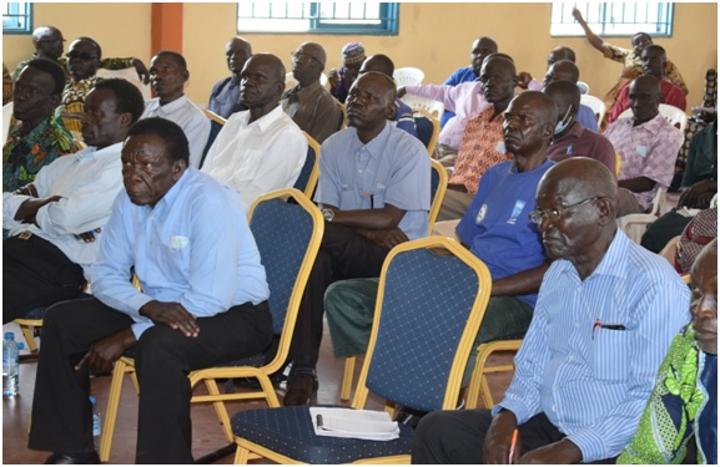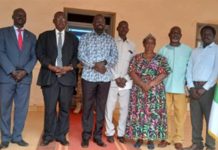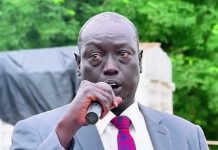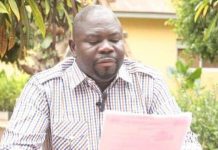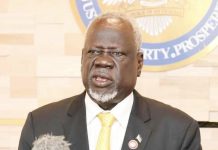Africa-Press – South-Sudan. By Yiep Joseph
The recent concluded five days Customary law review, and training for the traditional chiefs in the three counties of Morobo, Lainya, and Yei River deliberated on key issues such as adultery, Rape, Abduction, Elopement, seduction, murder, incest or sexual intercourse with a male or blood relative and impregnation of girls among others paved way for peaceful and stable communities in Central Equatoria state.
In his closing remark on Monday, Aggrey Cyrus Kanyikwa, the commissioner of Yei River county stated that the training would pave way for stable communities in Central Equatoria state through assurance of proper courts in various areas.
“we have learned our cultures among ourselves and chiefs now have knowledge about most issues surrounding our communities, therefore, this training would pave away for stable communities in Central Equatoria state” Cyrus said.
He revealed that the customary laws are important to bring peace among communities and there is need for state government to take part invalidating them in order to make them ready for use
“The reason why our honorable members are here is to make surethey help you by reporting all that we have discussed here such that the parliament can look into it and it becomes a law after validation” he added
He urged the state members of parliament to struggle and let customary law documents enter parliament for more discussion without delay in order help in reducing conflict among tribes in the counties.
He called on the local chiefs to be honest in handling the affairs in their various communities through fair judgment and inclusive decision making AjonyiLuata, Women Representative Morobo county court reaffirmed that the training would pave way to stable marriages in the counties.
“Our marriages are shake by the intervention of modern cultures, for example, people divorce at will without reasons, men beat women anyhow, women denied properties, all these had caused instability in the area, therefore, I am seeing the train as a mean for tribes and communities to move away from violent to peaceful means of handling issues” Ajonyi said.
He called on the women to take care of their children and teach on how to handle cultures and norms Chief Lasu ErastoLadu from LainyaCounty reaffirmed that after the workshop, chiefs would be free to follow the document that would be later developed to handle the affairs of the counties and Payam without being messed.
“After these workshops, we shall be stable because we have known ourselves, our cultures and the differences in our cultures, in particular, is known” Lasu expressed He called on the politicians to stop interfering with the activities of chiefs citing that politicians confused the community chiefs.
Meanwhile DanialLokorotowho represented parliamentarians during the event reaffirmed local government commitment in making sure traditional courts are upgraded to meet the need of the citizen. He added that the ascertaining and reviewing customary law would bring peace among the tribes citing that each tribe would have knowledge
Meanwhile, Justice Deng BiongMijak, consultant for IOM Customary law/rule of law stated that the workshop would help the chiefs to understand the importance of some practices and their negative parts.
He added that norms and cultures that are against human rights for example denial of women to own properties particularly the land, denial of women to eat some of the food, early and forced marriages among others are issues that should be reviewed.
While addressing the Media last week Benjamin Moore, IOM Program Coordinator stated that the review would focus on removing some of the practices that contradict the constitution and the bill of rights of South Sudan
“This is a community-driven process; it is where local solution is found for local problems that has a nationally important and the fact that this is community-driven, we see a representative of the three counties that are here about 150 participates who are seriously discussing on customary law” he added.
The five days training that brought 150 participants including chiefs, youths and women representatives across the three counties of Yei River, Lainya and Morobo of Central Equatoria was conducted by IOM under the project Locally Driven Solutions for Social Cohesion and Promoting Early Recovery in the country’s Former Breadbasket and funded by South Sudan Reconciliation and Resilience Trust Fund (RSRTF).
These stakeholders’ workshops aimed at ascertainment, review and documentation of the customary laws of the communities of Lainya, Morobo and Yei Counties and training of traditional chiefs, to strengthen the traditional justice system for peace, social cohesion and recovery in the three counties.
For More News And Analysis About South-Sudan Follow Africa-Press

